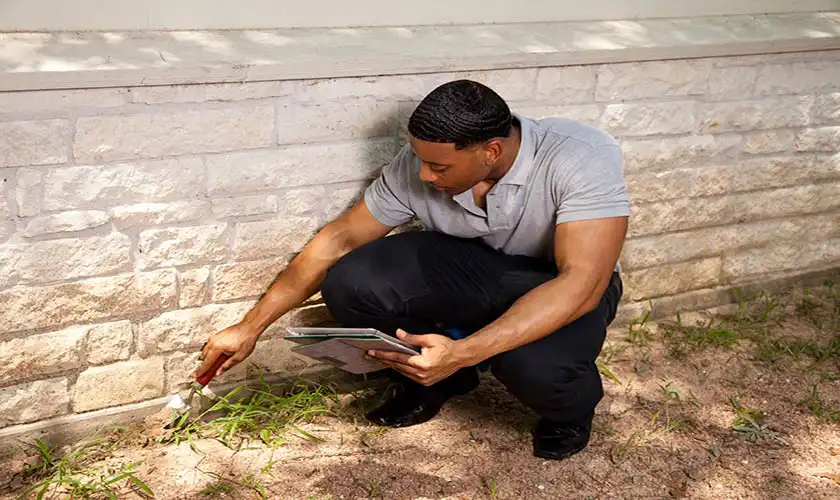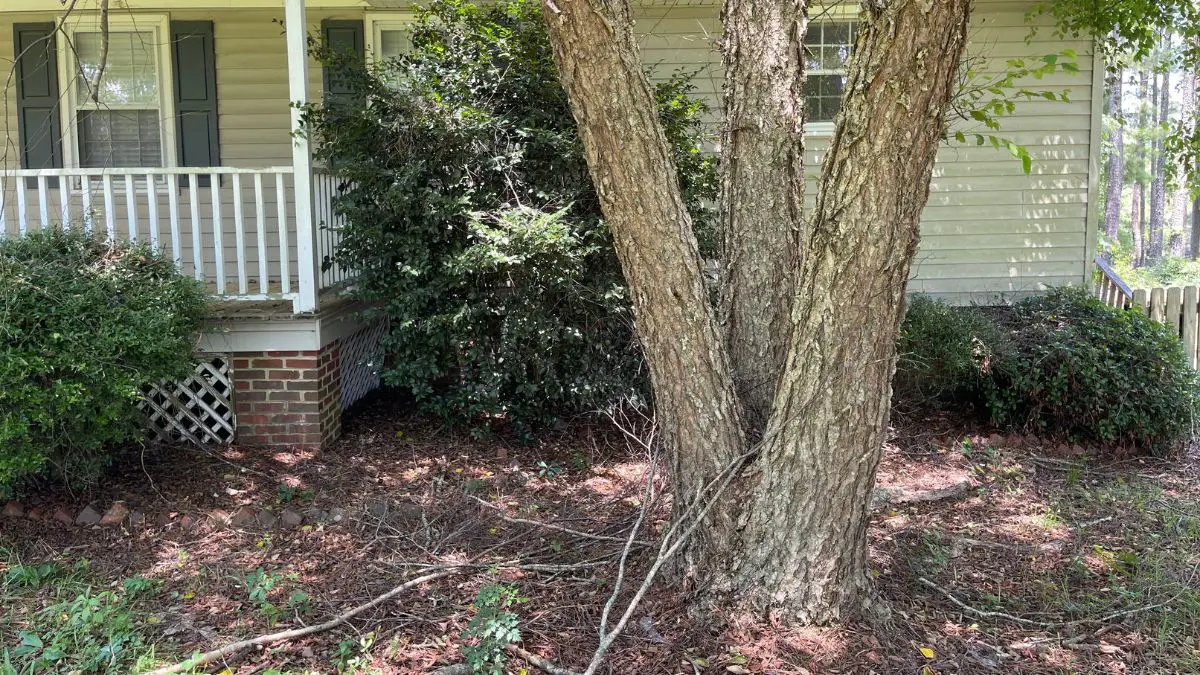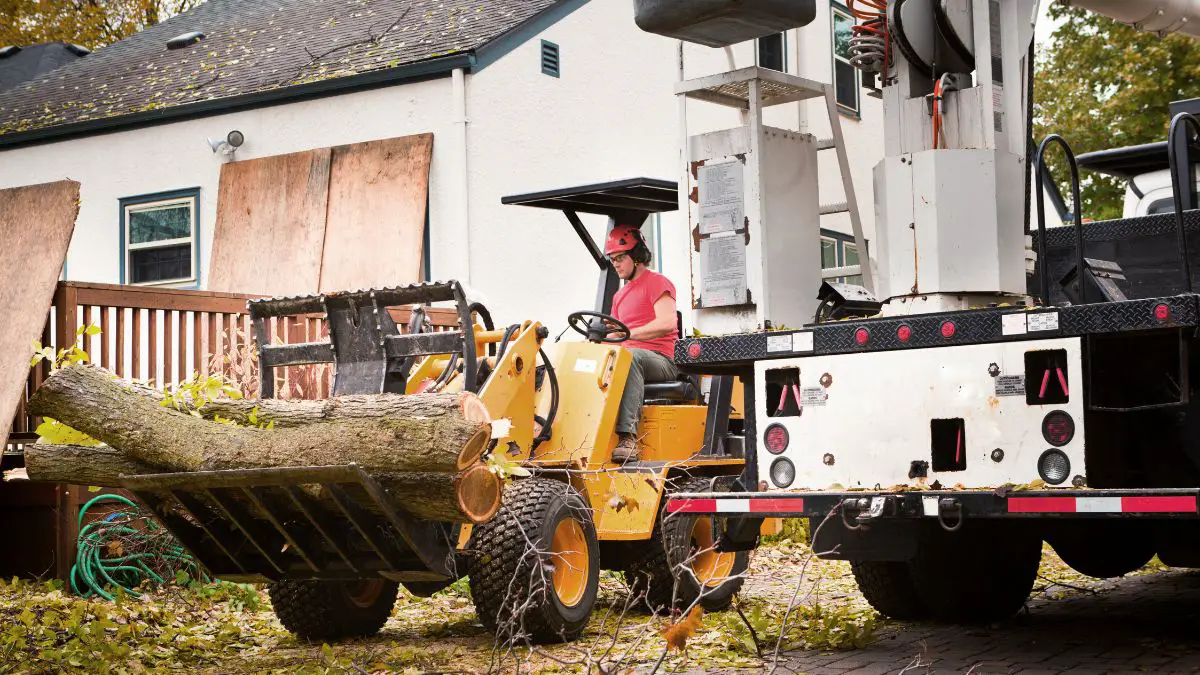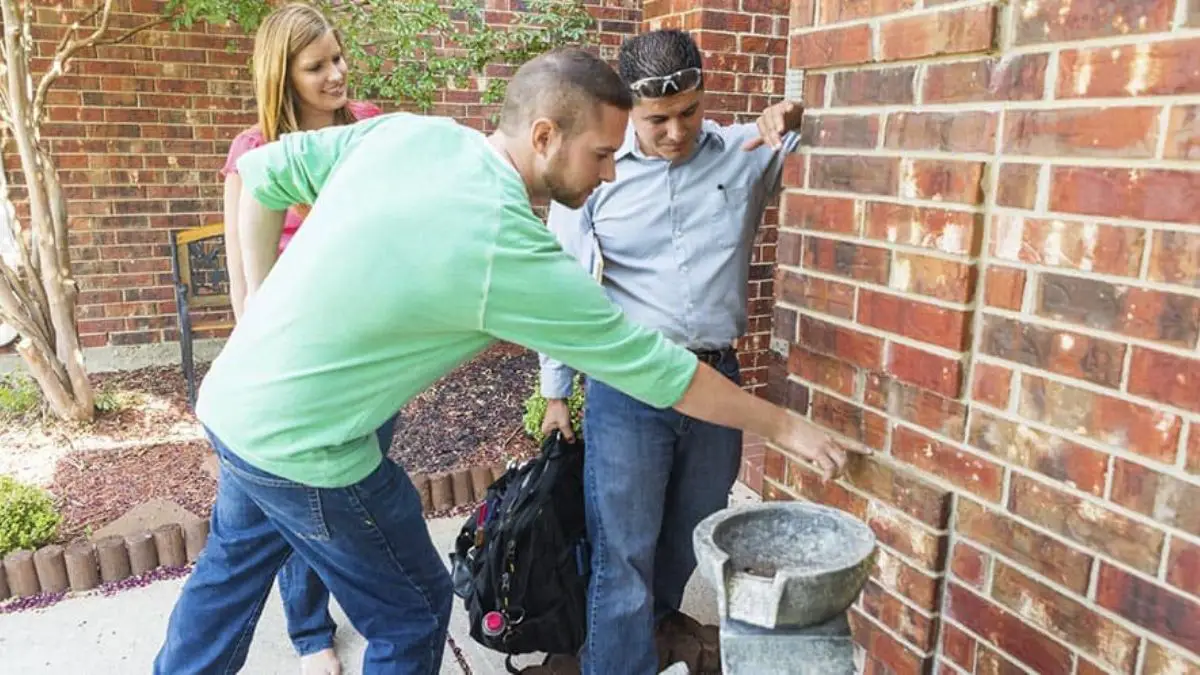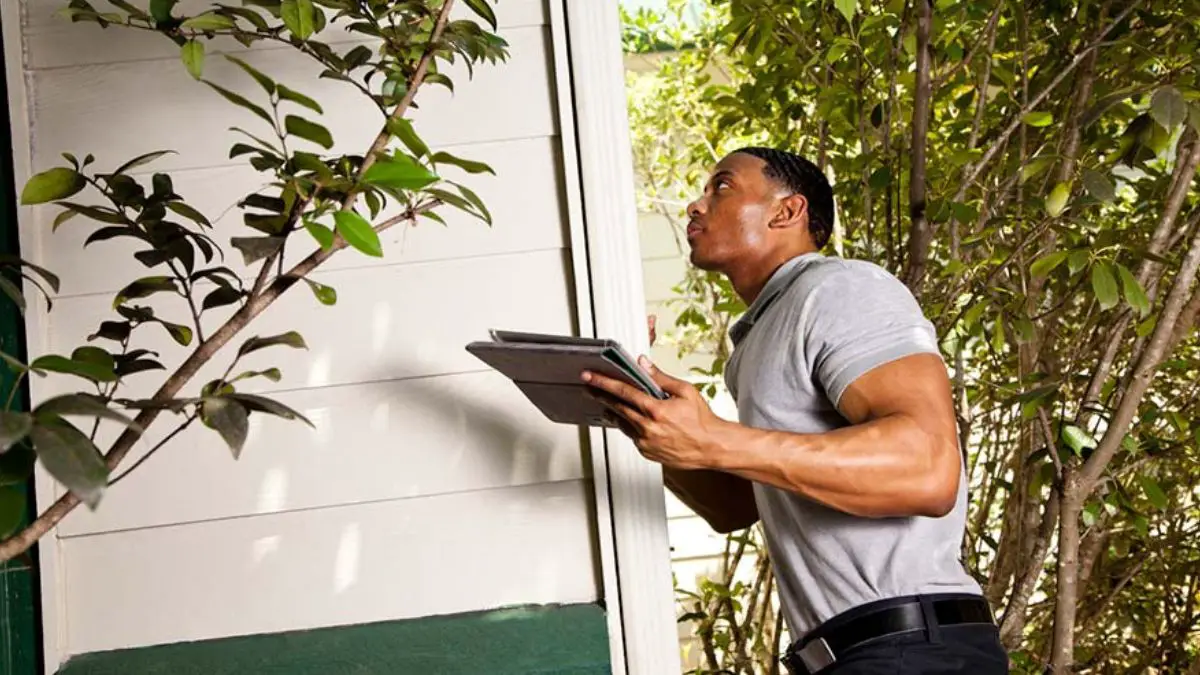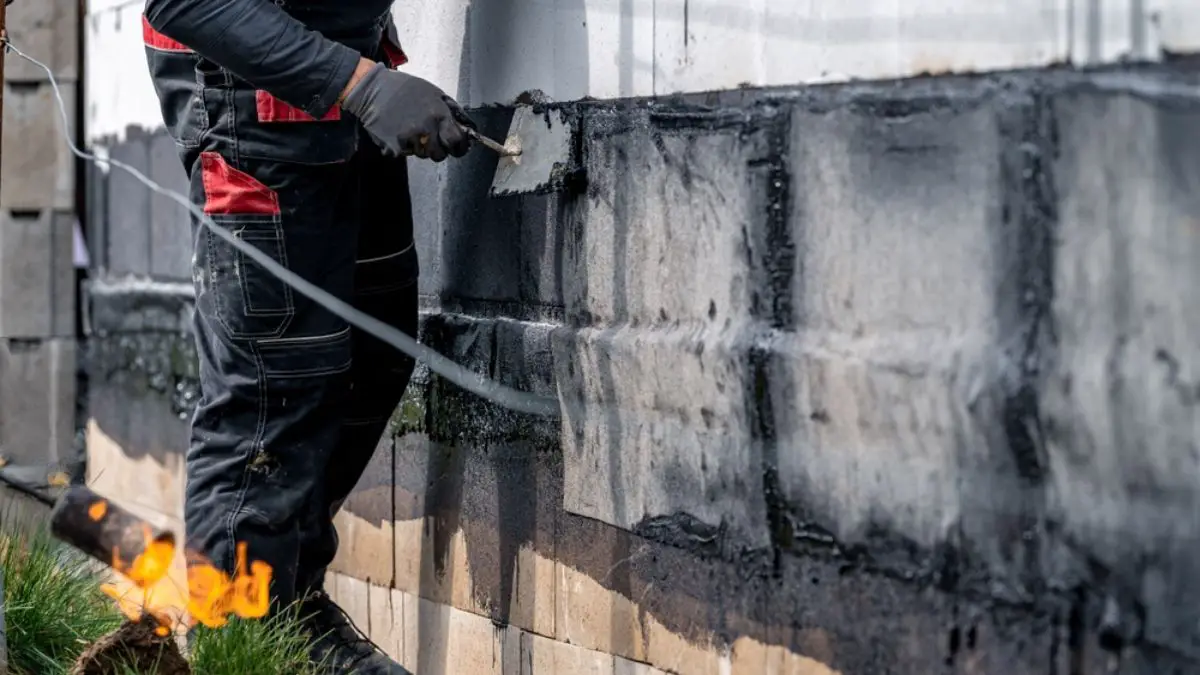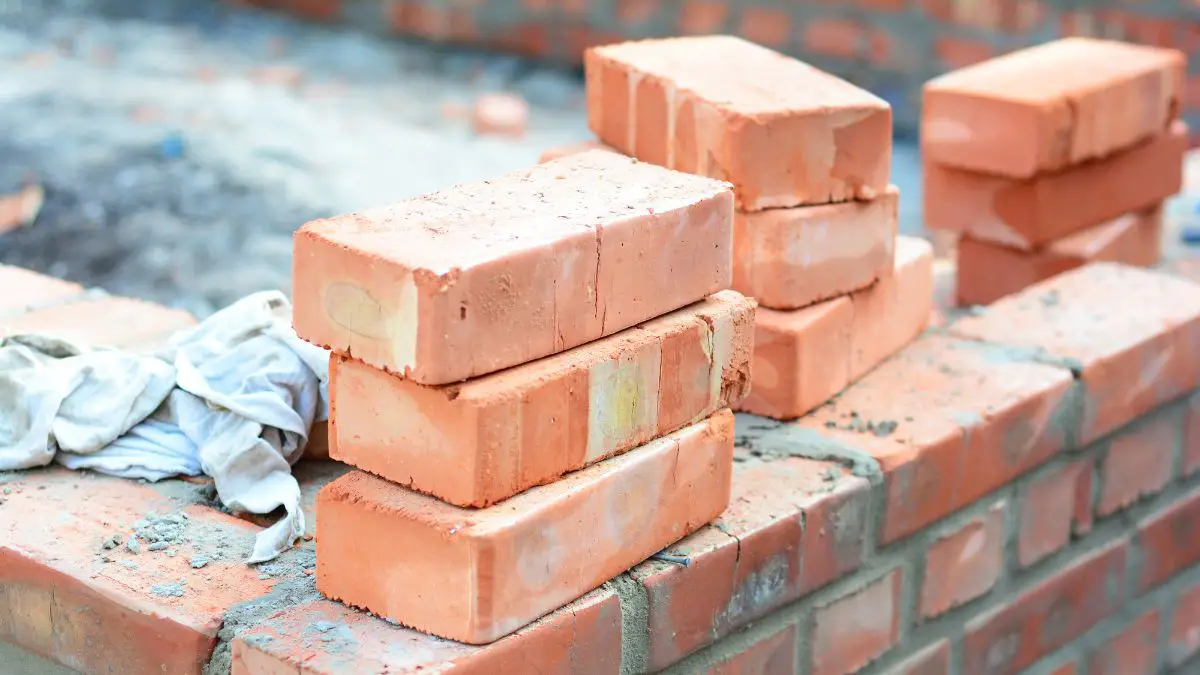A slab foundation repair cost is a huge financial burden for homeowners. Concrete slab foundations require specialized equipment and expertise and can range from thousands of dollars to tens of thousands depending on the extent of the damage.
Concrete slab foundation repair costs can vary greatly depending on the extent of the issue, but there are some steps you can take to ensure that you’re getting a fair deal.
According to foundation repair experts, slab foundation repair costs between $2,000 and $7,500, with a national average of $4,500. Severe foundation problems can run you up to $15,000 to $25,000.
Foundation specialists state that pricing ranges for drilled pier foundation repairs cost between $7,000 and $18,000, with extensive repairs costing $50,000 or more.
The labor cost for any technique of repairing a concrete foundation will be between $100 and $200 per hour. The average foundation repair cost varies depending on the problems:
- Poor drainage: $800 to $2,500
- Foundation cracks: $250 to $800
- Foundation leveling: $2,500 to $6,000
- Foundation replacement: $20,000 to $100,000
Get FREE quotes from local foundation repair contractors in your area today. Whether you need a pier replaced, basement waterproofing, or a full foundation replacement - We Can Help! All Contractors are screened, licensed, and insured.
| Key Takeaways |
|---|
| Slab foundation repair is a crucial process to maintain the structural integrity of a building. |
| The slab foundation repair cost can vary widely depending on the size and extent of damage, location and accessibility, repair methods and materials used, labor costs, geographical location, and soil conditions. |
| Underpinning or piering, mudjacking and sealing, and crack repair are common repair methods, each with varying costs. |
| When dealing with significant foundation issues, it’s important to consider the cost of a new slab foundation versus the repair cost. |
| Additional costs in slab foundation repair can include the cost of inspection and permits, and the cost of additional repairs and renovations. |
| Ways to save on slab foundation repair costs include preventive measures, negotiating with the contractor, checking for insurance coverage, and considering financing options. |
| Hydraulic piers are a common method used in slab foundation repair, particularly for foundation settlement or sinking issues. |
| Addressing drainage problems is critical in maintaining the integrity of your slab foundation. Proper drainage systems like gutters, tile drains, and French drains can help divert excess water away from your foundation. |
Let’s examine slab foundation repair costs and some foundation repair options.
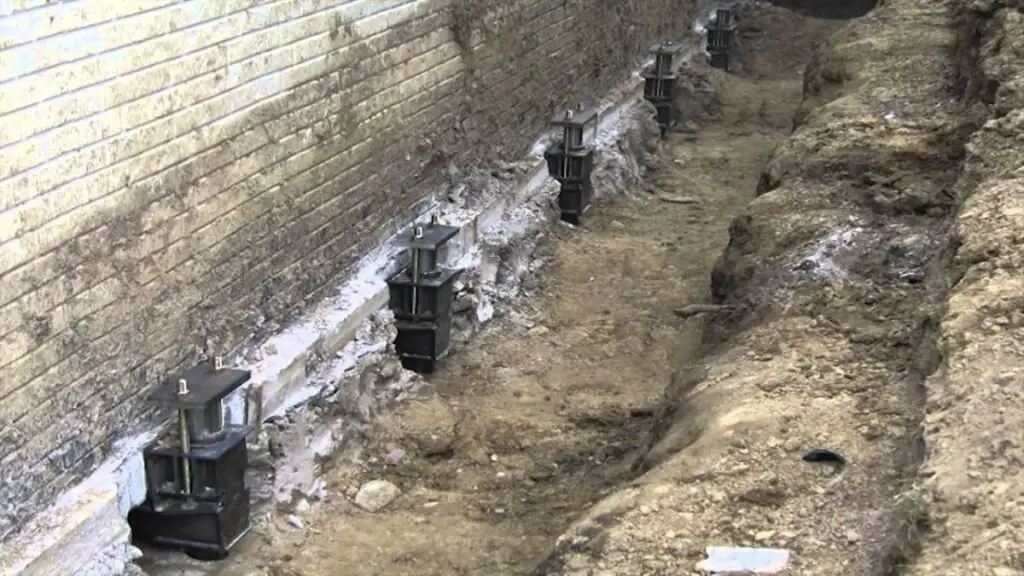
Understanding Slab Foundation Repair
Bad foundation problems can be a homeowner’s worst nightmare. These issues are often caused by soil movement, settling, or a combination of the two, and they can have devastating effects on a home’s structural integrity.
Some signs of foundation damage include cracks in walls and ceilings, doors and windows that stick, uneven flooring, and even sinking or shifting foundations.
Signs of Concrete Slab Foundation Failure
In slab foundations, several types of cracks can occur, each with its implications:
- Hairline Cracks: These are very thin, shallow cracks often occurring as the concrete cures and shrinks. They are usually not a cause for concern unless they widen or allow water to seep into the foundation.
- Shrinkage Cracks: These are similar to hairline cracks but are slightly larger. They occur due to the evaporation of water in the concrete during the curing process. Like hairline cracks, they are typically not a structural concern unless they widen significantly.
- Settlement Cracks: These occur when the soil beneath the foundation settles or shifts, causing the slab to move. Settlement cracks can be more serious and may indicate a problem with the soil or drainage around the foundation.
- Heaving Cracks: These are caused by the expansion of the soil beneath the foundation, often due to changes in moisture content. Heaving cracks can be serious and may require professional repair.
- Structural Cracks: Large, deep cracks extending through the slab. Excessive loads, soil movement, or other structural issues can cause them. Structural cracks are a serious concern and typically require foundation professional assessment and repair.
- Vertical Cracks: These are cracks that run up and down. They are usually the result of the foundation settling or heaving. While they can be serious, vertical cracks are often less severe than horizontal cracks because they align with the natural direction of concrete’s strength.
- Horizontal Cracks: These cracks run side to side. They can be a sign of serious issues, as they may indicate that the foundation is experiencing excessive lateral pressure from the soil around it. This can be due to soil expansion when it becomes saturated with water or frost heave in colder climates.
- Diagonal Cracks: These cracks run at an angle. They can be caused by differential settling of the foundation, where one part of the foundation settles more or faster than another part. This can occur if the soil beneath the foundation is not uniform or if drainage issues cause some parts of the soil to be more saturated than others.
Who Should Examine Slab Foundation for Failure?
A professional should evaluate any signs or widening cracks in a slab foundation to determine their cause and the appropriate repair strategy.
If you suspect your home has slab foundation problems, it is important to act quickly. Ignoring the issue can lead to more serious structural damage over time.
The first step in addressing slab foundation problems is getting a professional foundation inspection by a foundation repair company or a structural or geotechnical engineer.
- Structural Engineers focus on the design and analysis of structures. When dealing with concrete slab foundation problems, they inspect the property, identify structural issues, design a repair plan, and oversee the repair work.
- Geotechnical Engineers specialize in understanding the behavior of earth materials like soil. They conduct soil investigations, analyze soil conditions, and provide recommendations on addressing soil issues contributing to foundation problems.
Both play crucial roles in diagnosing and repairing concrete slab foundation problems, bringing unique skills and expertise to the process.
A structural report assesses a home’s integrity, focusing on the foundation, walls, and roof. It identifies any defects that could affect the building’s safety or performance.
A geotechnical report examines the ground and soil properties around the home. It provides information on soil composition, groundwater conditions, and load-bearing capacity to guide the design and construction of foundations and other structures.
A foundation specialist will be able to assess the severity of the problem and recommend appropriate foundation repair methods. In severe cases, a structural and geotechnical report may be necessary.
Professional foundation repair services can be expensive, but it is almost always necessary for serious slab foundation issues. DIY approaches to concrete slab repair are not recommended as they lack the expertise and equipment necessary for effective repairs.
Moreover, failure to address underlying poor soil conditions or improper repairs can lead to even more expensive repairs. The cost of a new slab foundation versus repair must also be considered when dealing with serious slab foundation problems.
In some cases with extensive damage or structural instability, installing a new concrete slab may be more cost-effective than attempting repairs that only provide short-term solutions. The decision should only be made after consulting with a professional who has thoroughly assessed the situation.
What is Slab Foundation Repair?
Slab foundation repair is the process of fixing issues that have arisen in a slab foundation. A slab foundation is made of a single layer of concrete several inches thick, laid on a bed of crushed gravel. This type of foundation is commonly used due to its cost-effectiveness and ease of installation.
However, slab foundations are not without their problems. Common issues include cracks due to ground movement or shrinkage, upheaval due to soil expansion, and settling due to soil compaction. These problems can lead to uneven floors, cracked walls and ceilings, and doors and windows that don’t close properly.
Factors Influencing Slab Foundation Repair Cost
Several factors can influence slab foundation repair prices. Understanding these factors can help you anticipate a ballpark estimate and make informed decisions regarding repairing your slab foundation.
Size and Extent of Damage
The foundation size and extent of the structural damage are among the most significant factors influencing the slab foundation repair cost. Larger areas with more extensive damage will require more foundation materials and labor to repair, increasing the total cost.
For instance, a small crack might only require some simple sealing, while a large crack or a significant shift in the foundation could require more extensive and costly repairs such as underpinning or piering.
Location and Accessibility
The location of the damage and its accessibility can also affect the cost. If the damaged area is hard to reach, the repair work can be more complex and time-consuming, leading to higher costs. For example, if the damage is located under a large, heavy structure that needs to be temporarily moved or supported, this can significantly increase the repair cost.
Repair Methods and Materials Used
Different repair methods have different costs. Some methods, like sealing and patching, are relatively inexpensive but might not be suitable for more severe damage.
Other methods, like underpinning and piering, are more expensive but can provide a more durable and long-lasting repair. The materials used can also affect the cost.
For instance, using high-quality, durable materials might cost more upfront but can provide better results and potentially save money in the long run by reducing the need for future repairs.
Labor Costs
The cost of labor can vary depending on the complexity of the job and the rates of the foundation repair contractor. More complex jobs will require more skilled labor and time, increasing costs. Additionally, professional contractors with more experience and a good reputation might charge more for their services, but they can also provide better quality work and a more reliable repair.
Geographical Location
The slab foundation repair cost can also vary depending on your geographical location. In areas where the cost of living is higher, you can expect to pay more for labor and materials. Additionally, certain regions might have specific building codes or requirements that can affect the repair cost.
Soil Conditions
The soil condition around and under your foundation can also affect the repair cost. The repair can be more complex and costly if the soil is unstable or prone to excessive moisture or movement. In some cases, additional work might be needed to stabilize the soil or improve drainage around the foundation.
While the slab foundation repair cost can be significant, it’s important to remember that each situation is unique. Getting a professional assessment and quote before proceeding with any repair work is always a good idea.
Average Cost of Slab Foundation Repair
The slab foundation repair cost can vary widely depending on the abovementioned factors. The cost can range from as low as $1,000 for minor repairs to as high as $10,000 for critical repairs.
Jay Sanders of Castle Dream Basement Waterproofing states that the average cost for foundation repair is typically in the ballpark of $5,000, but it can be much higher.
- Cost per Square Foot: The cost per square foot for slab foundation repair can range from $5 to $25, depending on the extent of the damage and the repair method used.
- Cost of Minor vs Major Repairs: Minor repairs, such as filling small cracks, can cost a few hundred dollars, while major repairs, such as underpinning a large area, can cost several thousand dollars.
- Cost of DIY vs Professional Repair: While DIY repair can save on labor costs, it can also be risky if you don’t have the necessary skills and experience. While more expensive, professional repair can ensure the job is done correctly and safely.
While the cost of slab foundation repair can be significant, it is a necessary investment to maintain the structural integrity and safety of your building. Regular inspection and timely repair can help prevent minor issues from turning into major problems, saving you money in the long run.
Common Types of Repair Methods and Costs
Regarding slab foundation repair, the method chosen can significantly impact the overall cost. Here are some common repair methods and their associated costs:
Underpinning or Piering
This method is often used when the soil beneath the foundation cannot support the structure’s weight. Underpinning or piering involves driving steel piers into the ground beneath the foundation until they reach a stable layer of soil or bedrock.
The foundation is then lifted onto these piers, stabilizing it and correcting any settlement issues. The cost of underpinning or piering can range from $1,000 to $3,000 per pier, depending on the depth to which the piers need to be driven and the number of piers required.
While this is one of the more expensive repair methods, it’s also one of the most effective for serious foundation issues.
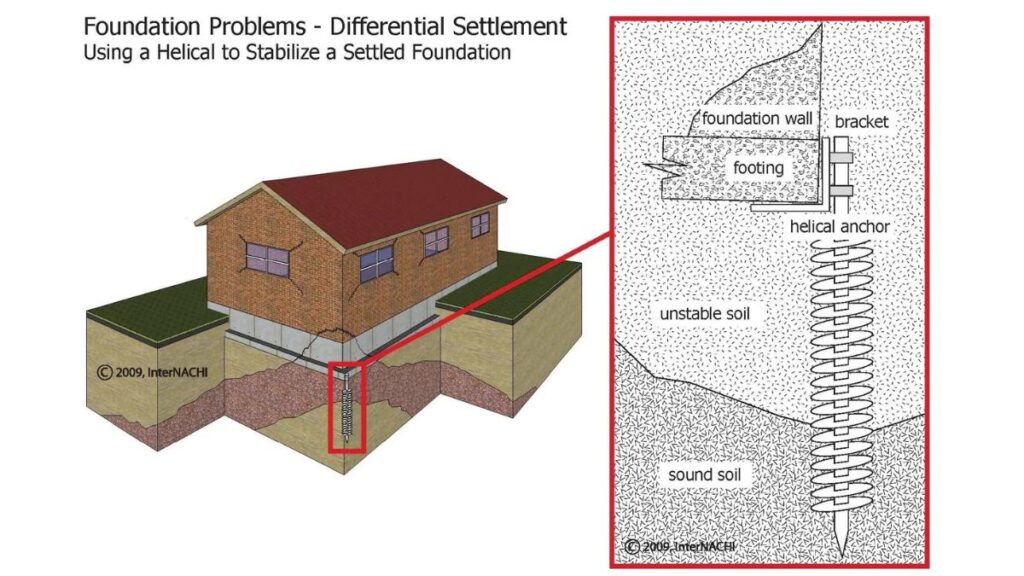
Helical Piers in Slab Foundation Repair
Helical piers, helical piles, or screw piles are commonly used in slab foundation repair. They are steel shafts with helical flights (screw-like blades) driven into the ground to provide foundation support.
Helical piers transfer the structure’s weight from unstable or weak soil to the piers, driven deep into the ground until they reach a soil or bedrock capable of supporting the structure. The helical anchors help pull the pier into the ground during installation and provide resistance when the structure’s weight is transferred to the pier.
The cost of installing helical piers can vary depending on several factors, including the size and weight of the structure, the depth to which the piers need to be driven, and the number of piers required. The average cost can range from $1,000 to $3,000 per pier.
Hydraulic Piers in Slab Foundation Repair
Hydraulic piers are steel shafts driven into the ground beneath the foundation using hydraulic pressure. These piers are installed until they reach a stable layer of soil or bedrock; at this point, they act as stilts, supporting the foundation and preventing further settlement.
Hydraulic piers are typically used when a foundation is sinking or settling due to unstable soil conditions. This can occur when the soil beneath the foundation cannot support the structure’s weight, often due to soil compaction, erosion, or expansive clay soils that swell and shrink with changes in moisture content.
The cost of installing hydraulic piers can vary depending on factors like the number of piers required, the depth to which they need to be driven, and the complexity of the installation. You can expect to pay between $1,000 and $3,000 per pier.
Mudjacking and Sealing
Mudjacking, or slab jacking, is a method to lift a sinking concrete slab. It involves pumping a mixture of water, soil, and cement beneath the slab to lift it back into place. Once the slab is level, any cracks are sealed to prevent water intrusion.
The cost of mud jacking and sealing typically ranges from $500 to $1,500, depending on the size of the area that needs to be lifted and the extent of the cracking. This method is a more affordable option for minor to moderate foundation issues.
Crack Repair
Crack repair is a common method used for minor foundation issues. It involves filling cracks in the slab with a sealant or epoxy. This can prevent water intrusion and further damage to the slab.
The cost of crack repair can range from $250 to $800, depending on the size and number of cracks. This method is most effective for minor cracks and unsuitable for addressing more serious foundation issues.
Slab Replacement
In some cases, the damage to the slab foundation may be so severe that a complete replacement is necessary. This involves removing the old slab and pouring a new one.
A rough estimate cost of slab replacement can range from $20,000 to $100,000, depending on the slab’s size and the job’s complexity. While this is the most expensive option, it can be the most effective solution for severe foundation issues.
Slab foundation repair costs can vary widely depending on the repair method used. It’s important to have a professional assess the damage to determine the most appropriate and cost-effective repair method for your specific situation.
Cost of New Slab Foundation vs Repair
When dealing with significant foundation issues, it’s important to weigh the cost of installing a new slab foundation against the cost of repairing the existing one. Both options come with their own set of considerations and costs.
New Slab Foundation
A new slab foundation involves the removal of the existing foundation and the installation of a new one. This is often considered when the existing foundation has extensive damage that is not cost-effective to repair.
The cost of a new slab foundation can range from $20,000 to $100,000 or more, depending on the size of the foundation, the geographical location, and the complexity of the installation. This cost includes the removal of the old foundation, site preparation, materials, labor, and any necessary inspections and permits.
While this is a significant cost, a new slab foundation has several benefits. It provides a fresh start, free from any existing issues or damage. It can also be designed and installed with modern techniques and materials, potentially offering better durability and performance than the old foundation.
Slab Foundation Repair
Slab foundation repair involves fixing the existing foundation to address any damage. The slab foundation repair cost can vary widely depending on the extent of the damage and the repair method used.
Minor repairs, such as filling small cracks, can cost a few hundred dollars, while major repairs, such as underpinning or piers, can cost several thousand dollars.
Repairing a slab foundation can be cost-effective if the damage is not too extensive. It allows you to address specific issues without needing a complete replacement.
For a foundation with serious or widespread issues, the cost of ongoing repairs can add up over time and may eventually exceed the cost of a new foundation.
Cost Comparison and Factors to Consider
When comparing the cost of a new slab foundation versus repair, it’s important to consider immediate and long-term costs and benefits.
A new foundation may have a higher upfront cost, but it can provide better long-term value if it avoids the need for ongoing repairs. On the other hand, if the existing foundation is generally in good condition with only minor issues, repairing it can be a more cost-effective solution.
Other factors to consider include the age and condition of the existing foundation, the cause of the foundation issues (and whether it’s likely to recur), and the potential impact on the value and saleability of the property.
The decision between a new slab foundation and repair should be made based on a thorough assessment of the existing foundation, careful consideration of the costs and benefits of each option, and professional advice.
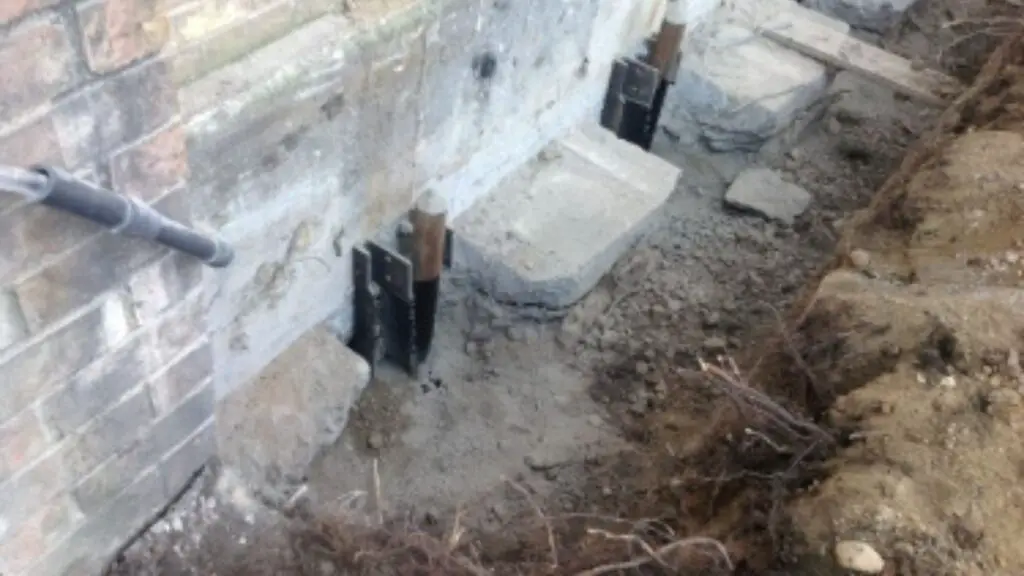
Additional Costs in Slab Foundation Repair
Beyond the direct costs of the repair method, there are additional costs to consider when planning for slab foundation repair. These can significantly impact the project’s overall cost and should be factored into your budget.
Inspection and Permits
Before any repair work can begin, an inspection is usually required to assess the damage and determine the best repair method. This can cost between $300 and $1,000, depending on the complexity of the inspection.
Additionally, permits may be required for the repair work, especially for more extensive repairs like underpinning or new piers. The cost of these permits can vary widely depending on local regulations but can range from $100 to several hundred dollars.
Additional Repairs and Renovations
Additional repairs or renovations may be needed if the foundation damage has led to other issues in the home, such as cracked walls, uneven floors, or misaligned doors and windows.
These costs can vary widely depending on the extent of the damage and the specific repairs needed. For example, repairing drywall cracks can cost $250 to $800, while leveling an uneven floor can cost $1,000 to $3,000.
Landscaping Restoration
Foundation repair work can often disrupt the landscaping around your home. Once the repair work is complete, you may need to restore or replace damaged grass, plants, or hardscaping. The cost of this can vary depending on the damage’s extent and the landscaping’s complexity. Still, it can easily add several hundred to several thousand dollars to the project cost.
Temporary Accommodation
You may need to vacate your home while the work is done for major foundation repairs. The cost of temporary accommodation, such as a hotel or rental home, should be factored into your budget.
Financing Costs
If you’re financing your foundation repair through a loan or credit card, don’t forget to consider the interest cost. Over time, these payment plan costs can add up and significantly increase the overall cost of the repair.
In conclusion, while the direct cost of foundation repair is a significant part of the overall cost, it’s important not to overlook these additional costs. You can budget more accurately and avoid unexpected expenses by considering all potential costs from the outset.
Ways to Save on Slab Foundation Repair Cost
Regular maintenance and early detection can prevent minor problems from becoming major, costly repairs. This includes regular inspections of your foundation for any signs of damage, insufficient drainage around it to prevent water damage, and addressing any issues as soon as they arise.
While slab foundation repair can be a significant expense, there are several strategies you can employ to help manage and reduce these costs:
Addressing Drainage Problems
One of the most critical factors in maintaining the integrity of your slab foundation is ensuring proper drainage around your home. Insufficient or improper drainage is a leading cause of foundation settlement or failure.
When excess moisture is allowed to accumulate near your foundation, it can lead to soil expansion and contraction, exert pressure on your foundation and lead to issues like cracking or shifting.
Drainage System Options to Save Your Foundation
Several types of drainage systems can help divert excess water away from your foundation:
- Gutters: Gutters are installed along the edges of your roof to collect rainwater and direct it away from your home. Without gutters, rainwater can pour directly off your roof and pool around your foundation, leading to soil erosion and increased hydrostatic pressure on your foundation walls.
- Downspouts: Downspouts are connected to your gutters and carry the water away from your home. Downspouts must extend at least 10 feet away from your foundation to prevent soil erosion at the mouth of the downspout and to ensure that water doesn’t pool near your foundation.
- Tile Drains: Also known as weeping tiles, pipes with perforations that allow water to enter. They are typically installed around the perimeter of your foundation or beneath the basement floor to collect and redirect water away from your home.
- French Drains: French drains are trenches filled with gravel and a perforated pipe that direct water away from your home. They are often installed in areas of your yard where water accumulates or in a ring around your home to intercept water before reaching your foundation.
By addressing drainage problems and ensuring that water is effectively directed away from your foundation, you can prevent many common foundation issues and potentially save thousands of dollars in foundation repair costs.
DIY Repairs
DIY repairs can be cost-effective for minor issues, such as small cracks or slight unevenness. Many resources are available online and in home improvement stores that can guide you through the process.
Having the necessary skills and knowledge to ensure the repairs are done correctly. Incorrect repairs can lead to further damage and ultimately cost more in the long run.
Get Multiple Quotes
Getting quotes from multiple contractors is always a good idea when hiring a professional. This can better understand the expected costs and allow you to compare prices and services.
However, remember that the cheapest quote isn’t always the best. Consider the foundation contractor’s experience, reputation, and quality of their work when making your decision.
Negotiate
Don’t be afraid to negotiate with your foundation repair company. Some may be willing to offer a discount for prompt payment, large jobs, or during their off-season when work is slower.
Check for Insurance Coverage
Depending on the cause of the damage to your foundation, your homeowner’s insurance may cover some or all of the repair costs. Check your policy and speak with your insurance agent to understand what is and isn’t covered.
Consider Financing Options
If the cost of repairs is too much to handle all at once, consider financing options. If using a large foundation company, they may offer financing plans, or you could consider a home equity loan or line of credit. Be sure to understand the terms and interest rates before choosing this option.
Tax Deductions
In some cases, you may be able to deduct the cost of your foundation repairs from your taxes as a home improvement. Consult with a tax professional to see if this applies to your situation.
Remember, while saving money is important, ensuring that your foundation repairs are done correctly and thoroughly is equally important. Cutting corners to save money can lead to more serious and costly problems down the line.
FAQs About Slab Foundation Repair Costs
Can you rebuild on slab foundation?
It is possible to rebuild on a slab foundation even if it has issues like sinking or settling. Several methods can be used to repair a slab foundation, including slab jacking, polyurethane foam jacking, and filler material injection. However, if the slab foundation is in good condition, it can be reused for new construction, provided the slab meets local code requirements.
When should you walk away from foundation problems?
Walking away might be more economical if foundation problems are severe and the repair cost is high. However, this decision should be made after getting a professional assessment of the damage and a quote for the repair work.
Is it normal for a slab foundation to crack?
Small cracks in a slab foundation can be normal and are often caused by the concrete shrinking as it cures. However, large cracks or cracks that continue to grow can indicate a serious problem, such as soil movement beneath the slab.
Can you have foundation issues on a slab?
Yes, slab foundations can have issues like any other type of foundation. Common issues include cracks, settling or sinking, and upheaval. Regular inspections can help detect these issues early before they become serious.
Conclusion
In conclusion, while the cost of slab foundation repair can be significant, it’s a necessary investment to maintain the structural integrity and safety of your building.
You can make informed decisions about your slab foundation repair by understanding the different repair methods, their costs, and the additional costs involved. Remember, regular maintenance and early detection of issues can save you money in the long run by preventing minor issues from turning into major, costly repairs.
Sources:


